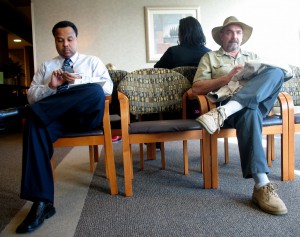Waiting at the Doctor’s Office
If there’s a professional emergency, like a patient who is extremely sick or a personal emergency, like the physician or her family is ill, most patients are okay with waiting to see their doctor. But if waiting at the doctor’s office occurs on a regular basis, what’s the message? That’s right…the physician’s time is more important than anyone else’s time. That’s the opinion of Dr. Joseph Ross and Dr. Mitchell Katz in an editorial published this month in JAMA.
 They came to this conclusion after reading an analysis of the 2003-2010 American Time Use Survey. The analysis, published in August, found that going to the doctor’s office takes about 121 minutes (a little over two hours). The calculation includes 37 minutes of travel and “clinic time” of 84 minutes. The average amount of time with the physician in face-to-face interaction was 20 minutes. That means 64 minutes of the time at the clinic was spent waiting, perhaps filling out paperwork or meeting a nurse, paying the bill; not seeing the physician for care.
They came to this conclusion after reading an analysis of the 2003-2010 American Time Use Survey. The analysis, published in August, found that going to the doctor’s office takes about 121 minutes (a little over two hours). The calculation includes 37 minutes of travel and “clinic time” of 84 minutes. The average amount of time with the physician in face-to-face interaction was 20 minutes. That means 64 minutes of the time at the clinic was spent waiting, perhaps filling out paperwork or meeting a nurse, paying the bill; not seeing the physician for care.
This analysis included opportunity costs, estimated in self-reported wages of $43 per office visit. They also noted that the figure of 20 minutes for face-to-face interactions with physicians may be 30 to 40% over-estimated based on direct observational research conducted by others.
For freelancers or others whose work is time based, losing time is losing money. Being sick and made to wait can increase physical, emotional and mental distress. Long waits don’t reduce suffering in healthcare.
So the question is “why are you being kept waiting?”
As Ross and Katz noted, emergencies happen. If your visit is to a surgeon, delays may be inevitable. This is because a surgeon’s time is dictated by the surgery schedule at a hospital or ambulatory facility and also complications that can arise during surgery. So clinic time is delayed.
But the culprits for wait times could be scheduling inefficiencies or even the philosophy of the practice. For example, if seeing as many patients a possible in the day is the philosophy of the medical practice, then the practice may overbook patients to compensate for no shows. Overbooking may take the form of filling all time slots with patients instead of scheduling open time slots to allow for emergencies or longer patient visits.
Coping with Waiting at the Doctor’s Office
![]() The two best times to book an appointment are the first appointment in the morning or the first appointment after lunch. Trying for those times may reduce your experience of waiting time.
The two best times to book an appointment are the first appointment in the morning or the first appointment after lunch. Trying for those times may reduce your experience of waiting time.
![]() Others recommend calling the doctor’s office ahead of your appointment time to find out if the doctor is running late.
Others recommend calling the doctor’s office ahead of your appointment time to find out if the doctor is running late.
![]() When scheduling, ask if the practice schedules blocks of patients for appointment times. For example, the office staff may schedule 3 people for a 2 pm appointment. With that type of scheduling, your appointment becomes a first come, first served proposition. You can ask for a firm appointment time when making your appointment. This may not be available. But if you know your appointment is first come first served, arriving 15 minutes early may help reduce your wait time.
When scheduling, ask if the practice schedules blocks of patients for appointment times. For example, the office staff may schedule 3 people for a 2 pm appointment. With that type of scheduling, your appointment becomes a first come, first served proposition. You can ask for a firm appointment time when making your appointment. This may not be available. But if you know your appointment is first come first served, arriving 15 minutes early may help reduce your wait time.
![]() Always bring something to do with you to your office visit. Find out if your physician’s office has free Wi-Fi available so that you can work while waiting.
Always bring something to do with you to your office visit. Find out if your physician’s office has free Wi-Fi available so that you can work while waiting.
![]() Check in when you arrive. Often people forget to let the office personnel know that they are present.
Check in when you arrive. Often people forget to let the office personnel know that they are present.
![]() After you have waited 15 minutes past your appointment time, go up to the window and ask how long your wait will be. If you want, ask to reschedule your appointment for another day.
After you have waited 15 minutes past your appointment time, go up to the window and ask how long your wait will be. If you want, ask to reschedule your appointment for another day.
What happens if you have a long wait.
![]() Do not show your anger in person. It won’t help the situation. When you get home, write a letter to your doctor about the incident and ask for change.
Do not show your anger in person. It won’t help the situation. When you get home, write a letter to your doctor about the incident and ask for change.
![]() Some people write an online review, especially if their experience is consistent. If you are often waiting for your physician, you may need to look for another doctor.
Some people write an online review, especially if their experience is consistent. If you are often waiting for your physician, you may need to look for another doctor.
Your Thoughts
What do you think? Do you experience wait times for care? Do wait times bother you? Do you have coping strategies that you can share? Please share your experience in the comments section.





